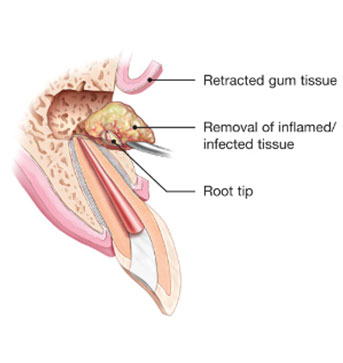600 Crowfoot Crescent NW
Calgary, AB T3G 0B4
 Root canal therapy is a very successful treatment procedure; however, there are a few cases where the infection persists after initial endodontic treatment. There is one last effort that can often be performed to preserve the tooth: an Apicoectomy.
Root canal therapy is a very successful treatment procedure; however, there are a few cases where the infection persists after initial endodontic treatment. There is one last effort that can often be performed to preserve the tooth: an Apicoectomy.
An apicoectomy is a minor surgical procedure in which the chronic infection and the tip of the tooth’s root is removed (apico apex or end; ectomy removal) and sealed. This procedure is commonly performed by an endodontist.
To have an understanding of endodontic surgery, it helps first to know something about the nonsurgical endodontic procedure. Root canal treatment is necessary when the soft inner tissue or “pulp” of the tooth becomes inflamed or infected. This may happen as a result of deep decay, repeated dental procedures on the tooth or a traumatic blow to the tooth. In a few cases, however, nonsurgical endodontic treatment alone cannot save the tooth. In such a case, your endodontist may recommend surgery to help preserve your tooth.
In this procedure, the endodontist opens the gum tissue near the tooth to see the underlying bone and to remove any inflamed or infected tissue. The very end of the root is also removed. A small filling may be placed to seal the end of the root, and a few stitches are placed in the gum to help the tissue heal properly. Over a period of months, the bone heals around the end of the root.
Apical surgery can help save your tooth in a variety of situations.